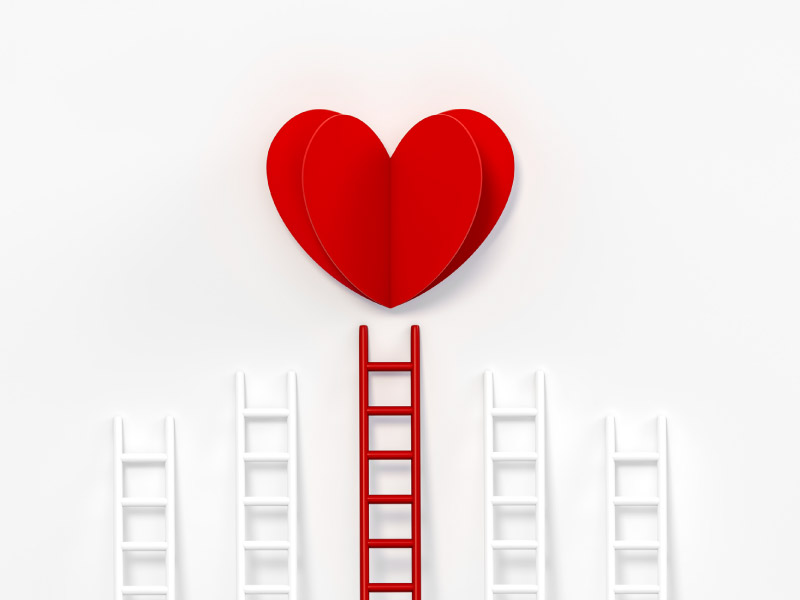How you feel about your place on the social ladder can affect your health
By Michael Precker, American Heart Association News

How do you feel about yourself and your place in society? The answer could affect not just your state of mind, but your actual health.
"When you ask people to make a social comparison of where they stand in society, we find a significant effect on physical health outcomes," said Jenny Cundiff, assistant professor of psychology at the University of Alabama who studies the subject. "It's not just what you have, but where you think you stand in relation to others that might be important for your health."
Scientists are still trying to establish why that is. But studies have shown a correlation between a low subjective social status (SSS), the formal term for the self-assessment of social rank, and poorer health.
A 2016 meta-analysis in the medical journal BMJ Open reviewed nine studies and concluded that people with low SSS were more likely to have coronary artery disease, high blood pressure, diabetes, obesity and high cholesterol than those who ranked themselves higher on the social status scale.
In August, a study in the Journal of the American Heart Association showed Hispanic adults with higher SSS had better cardiovascular health than those farther down the scale. The study used the AHA's Life's Simple 7, a compilation of modifiable heart-healthy factors – smoking status, physical activity, diet, body mass index, blood pressure, cholesterol and glucose levels – and a 10-rung "ladder" known as the MacArthur Scale of Subjective Social Status.
Experts differentiate between subjective social status – one's own opinion – and objective social status, which is assessed through income, education levels, employment and other clearly measurable factors.
People with higher socioeconomic status generally have better overall health for reasons that seem apparent: more money, better access to health care, better neighborhoods and other factors known as the social determinants of health.
So why is the subjective side of the coin hurting us? The leading theory, Cundiff said, is stress.
"The idea is that these social comparisons create anxiety," she said, "and what's not good for your mental health is typically not good for your physical health."
Chronic stress can lead to high blood pressure, a risk factor for heart attack and stroke. It also can prompt unhealthy behaviors for the heart such as smoking, poor diet, poor sleep, overeating and lack of physical activity.
Beyond the economic and material uncertainties of life that contribute to low subjective social status, Cundiff said she believes how we treat each other is a factor as well.
"I don't think our perceptions of social status come from nowhere," she said. "Exposure to other people's behaviors, being domineering or controlling or hostile, is probably associated with our perception of social rank."
That may also hold true in less materialistic cultures where the gap between haves and have-nots is not as obvious.
"In societies where there's not really much stratification or wealth differences, the status differences are more subtle, but we still see the effects," said Christopher von Rueden, an anthropologist at the University of Richmond's Jepson School of Leadership Studies in Virginia.
His team has studied Tsimane villages in Bolivia, where rural hunters and farmers have roughly equal material wealth but varied levels of political influence. Their study found that influential men had less cortisol – a stress hormone that causes health problems when the body manufactures too much – and lower risk of respiratory infection.
The stress caused by feeling less in control, von Rueden said, might be compounded by how low subjective status can cause a short-term outlook, emphasizing immediate rewards over long-term considerations.
"That could lead to lifestyle choices that have negative health consequences in the future," he said.
Raising one's subjective social status, both experts said, is easier said than done.
"Beyond creating a more equitable society, people can join groups or build social networks that offer coping mechanisms," von Rueden said.
Individually, Cundiff said, it may help to focus on ourselves.
"Instead of comparing ourselves to other people, we need to look internally and think, 'I have enough, I'm valuable, even if I don't own a lot of things or have the corner office.'"
She also invokes an adage that has been attributed to Mark Twain, Theodore Roosevelt and others.
"I'm not sure who said it first, but it holds true here," Cundiff said. "Social comparison is the thief of joy."
If you have questions or comments about this story, please email [email protected].




